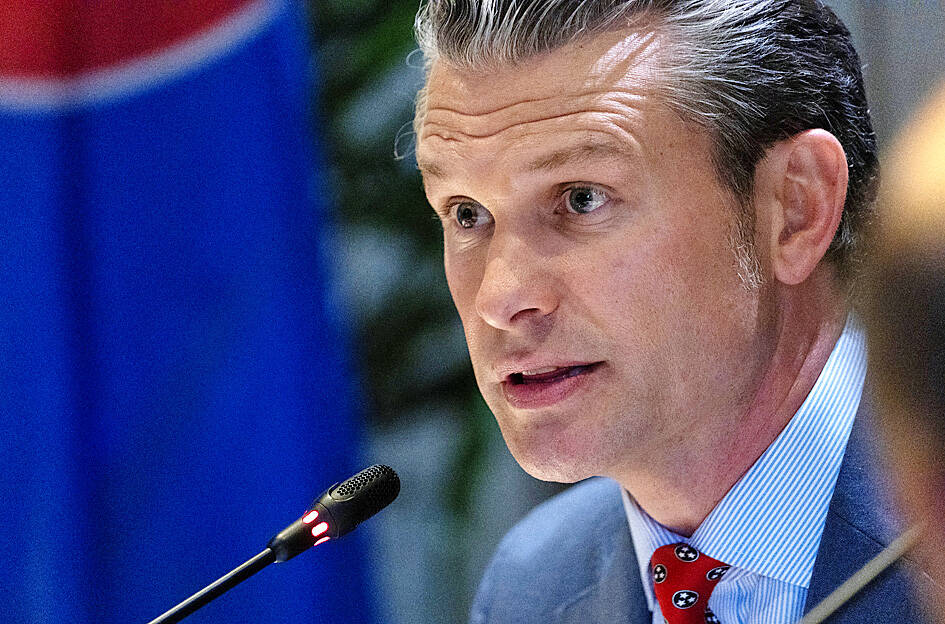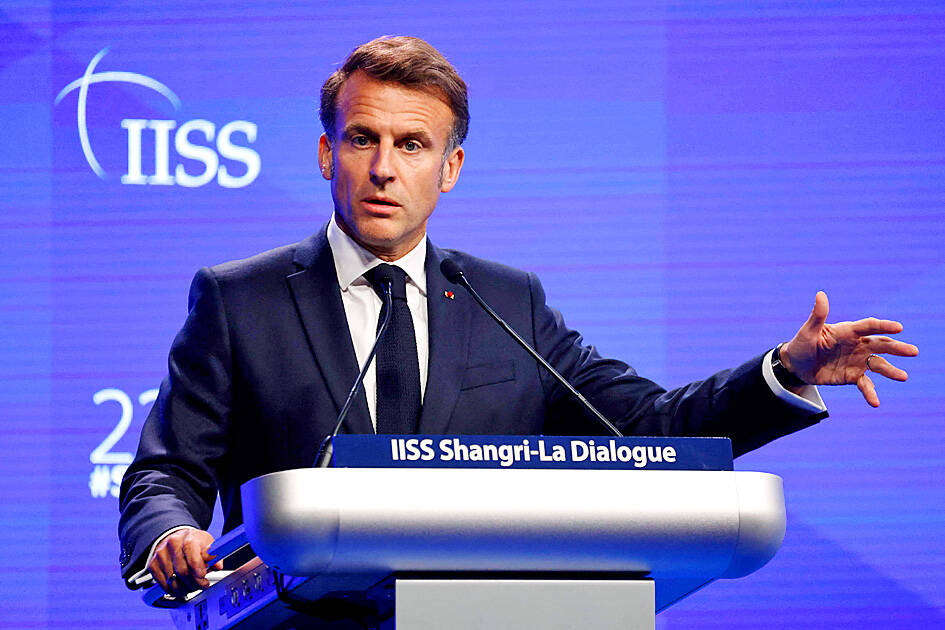French President Emmanuel Macron and US Secretary of Defense Pete Hegseth are among the world leaders, diplomats and top defense officials who are in Singapore this weekend for a security forum that is to focus on China’s growing assertiveness, the global impact of Russia’s war on Ukraine and the flare-up of conflicts in Asia.
Macron was to open the conference with a keynote address yesterday night, touching on all of those issues, as well as the pressure the hefty tariffs announced by US President Donald Trump’s administration is putting on Asian allies.
Hegseth said that Washington’s policies were meant to deter a Chinese invasion of Taiwan.

Photo: EPA-EFE
“We seek no conflict with anybody, including the Communist Chinese,” he said. “We will stay strong for our interests. And that’s a big part of what this trip is all about.”
China, which usually sends its minister of defense to the forum, sent a much lower level delegation instead, represented by Major General Hu Gangfeng (胡鋼鋒), the vice president of the People’s Liberation Army National Defense University.
The delegation was expected to speak today on a panel on “cooperative maritime security” alongside representatives from Japan, Vietnam, Chile and the UK.

Photo: AFP
Officials traveling with Hegseth, who spoke on the condition of anonymity, because they were not authorized to speak to the media, called the absence of a higher-level Chinese delegation an opportunity for the US to make inroads.
Hegseth had visited the Philippines in March, which brought a degree of relief over growing concerns from the Philippines and others in the region about US support from a president who has taken more of a transactional approach to diplomacy and seems wary of foreign engagements.
The US has been pursuing a “free and open Indo-Pacific” policy, which includes regularly sailing warships through the Taiwan Strait and in the South China Sea.
Several European nations have also taken part in freedom of navigation exercises in the region, including France, which sent a carrier strike group on a five-month mission through the Indo-Pacific that concluded last month.
In its published Indo-Pacific region strategy, France has underscored the need to “preserve a rules-based international order” in the face of “China’s increasing power and territorial claims” and its global competition with the US.
Following a meeting yesterday with Singaporean Prime Minister Lawrence Wong (黃循財), Macron told reporters there was room in the region for more than just the two superpowers.
“We are neither China nor the US, we don’t want to depend on any of them,” he said. “We want to cooperate with both as far as we can, and we can cooperate for growth and prosperity and stability for our people and the world order, and I think this is exactly the same view of a lot of countries and a lot of people of this region.”
Wong underscored Macron’s point, saying that Singapore and the greater region were not looking for exclusive arrangements with any single power.
“We want to embrace comprehensive engagement with all parties and embrace win-win arrangements rather than zero-sum competition,” he said.

Right-wing political scientist Laura Fernandez on Sunday won Costa Rica’s presidential election by a landslide, after promising to crack down on rising violence linked to the cocaine trade. Fernandez’s nearest rival, economist Alvaro Ramos, conceded defeat as results showed the ruling party far exceeding the threshold of 40 percent needed to avoid a runoff. With 94 percent of polling stations counted, the political heir of outgoing Costa Rican President Rodrigo Chaves had captured 48.3 percent of the vote compared with Ramos’ 33.4 percent, the Supreme Electoral Tribunal said. As soon as the first results were announced, members of Fernandez’s Sovereign People’s Party

MORE RESPONSIBILITY: Draftees would be expected to fight alongside professional soldiers, likely requiring the transformation of some training brigades into combat units The armed forces are to start incorporating new conscripts into combined arms brigades this year to enhance combat readiness, the Executive Yuan’s latest policy report said. The new policy would affect Taiwanese men entering the military for their compulsory service, which was extended to one year under reforms by then-president Tsai Ing-wen (蔡英文) in 2022. The conscripts would be trained to operate machine guns, uncrewed aerial vehicles, anti-tank guided missile launchers and Stinger air defense systems, the report said, adding that the basic training would be lengthened to eight weeks. After basic training, conscripts would be sorted into infantry battalions that would take

GROWING AMBITIONS: The scale and tempo of the operations show that the Strait has become the core theater for China to expand its security interests, the report said Chinese military aircraft incursions around Taiwan have surged nearly 15-fold over the past five years, according to a report released yesterday by the Democratic Progressive Party’s (DPP) Department of China Affairs. Sorties in the Taiwan Strait were previously irregular, totaling 380 in 2020, but have since evolved into routine operations, the report showed. “This demonstrates that the Taiwan Strait has become both the starting point and testing ground for Beijing’s expansionist ambitions,” it said. Driven by military expansionism, China is systematically pursuing actions aimed at altering the regional “status quo,” the department said, adding that Taiwan represents the most critical link in China’s

‘REALLY PROUD’: Nvidia would not be possible without Taiwan, Huang said, adding that TSMC would be increasing its capacity by 100 percent Nvidia Corp CEO Jensen Huang (黃仁勳) on Saturday praised and lightly cajoled his major Taiwanese suppliers to produce more to help power strong demand for artificial intelligence (AI), capping a visit to the country of his birth, where he has been mobbed by adoring fans at every step. Speaking at an impromptu press conference in the rain outside a Taipei restaurant, where he had hosted suppliers for a “trillion-dollar dinner,” named after the market capitalization of those firms attending, Huang said this would be another good year for business. “TSMC needs to work very hard this year because I need a lot